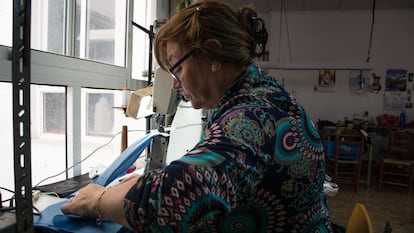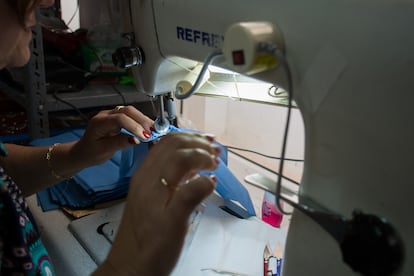With hospitals facing shortages, Spanish shoemakers start sewing face masks to fight coronavirus crisis
A local initiative by women who stitch shoes at home has already produced 5,000 units, and the idea has caught on across the country

The Spanish healthcare system is running out of protective gear for health workers, of whom at least 455 have been infected by the coronavirus by the latest count. On Wednesday, the head of the health service of the northeastern region of Aragón, Javier Marión, broke into tears at a news conference as he was discussing the risk that workers face each day at hospitals and other health centers.
The shortage of face masks in Spain, which ranks fourth in the world in number of coronavirus cases, has inspired several civil society initiatives. In Elda, in Alicante province, a group of aparadoras – women who stitch shoes in their own homes, often in precarious working conditions – spent last weekend making thousands of face masks for the area hospital.
I deserve no special credit for this, I’m just one link in the chainMaría Luisa del Amo, aparadora
The idea came from a nurse at a health center in the nearby town of Petrer: why not seek help from the aparadoras, who have extensive experience with sewing and stitching for the region’s powerful shoemaking industry?
Local authorities coordinated the effort: using fabric provided by the general hospital and rubber bands donated by a local business, scores of women from Elda and Petrer got to work, and have so far produced over 5,000 masks.
The chain of solidarity has since extended to other parts of the industry, and several companies are now offering to cut the pieces of fabric and donating material of their own.
The idea has been so inspirational – and the need for face masks is so acute – that authorities in Petrer have been flooded with requests for information from groups who want to do the same thing, including a sewing workshop in Madrid and a housewife association from Torrox (Málaga). “For the last two days we’ve been getting calls nonstop, ever since the story made the news,” said Petrer Mayor Irene Navarro.

The media exposure was largely the work of Juan Membrive, a young marketing expert who used social media to share information about the initiative. Like his own mother, most of the 50 people who are sewing the masks are women who have been assembling shoes for decades.
“Right now I am waiting for more material to arrive, because we’ve run out and there are many of us,” said Juan’s mother, María Luisa Del Amo Parrilla, 57, in a telephone conversation on Tuesday. “When the felt arrives, it’s like a square. I fold it, shape it, sew the sides, fold it again, attach the rubber bands and sew it again.” The masks then get picked up and delivered to the area hospital, where they are sterilized before use.
María Luisa Del Amo is doing this volunteer work on weekends and on weekdays after putting in her own hours making shoes. “Making masks is all about skill,” she says. “Any seamstress could sew them, and everybody wants to help make them right now. I deserve no special credit for this, I’m just one link in the chain.”
English version by Susana Urra.
Tu suscripción se está usando en otro dispositivo
¿Quieres añadir otro usuario a tu suscripción?
Si continúas leyendo en este dispositivo, no se podrá leer en el otro.
FlechaTu suscripción se está usando en otro dispositivo y solo puedes acceder a EL PAÍS desde un dispositivo a la vez.
Si quieres compartir tu cuenta, cambia tu suscripción a la modalidad Premium, así podrás añadir otro usuario. Cada uno accederá con su propia cuenta de email, lo que os permitirá personalizar vuestra experiencia en EL PAÍS.
¿Tienes una suscripción de empresa? Accede aquí para contratar más cuentas.
En el caso de no saber quién está usando tu cuenta, te recomendamos cambiar tu contraseña aquí.
Si decides continuar compartiendo tu cuenta, este mensaje se mostrará en tu dispositivo y en el de la otra persona que está usando tu cuenta de forma indefinida, afectando a tu experiencia de lectura. Puedes consultar aquí los términos y condiciones de la suscripción digital.








































